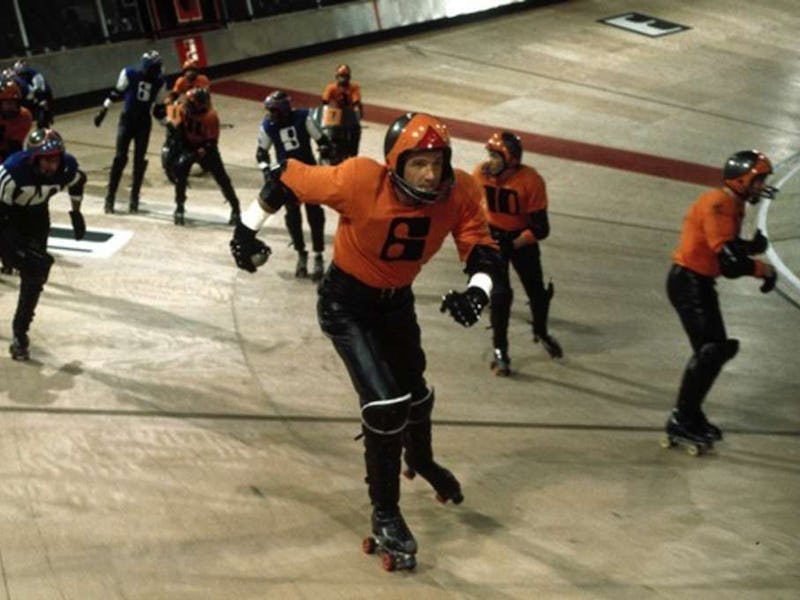You need to watch the best high-octane sci-fi movie on Amazon Prime ASAP
Only one 1975 cult classic offers a killer sci-fi dystopia and thrilling sports action.

American sci-fi got weird between the 1968 release of 2001: A Space Odyssey and the release of Star Wars in 1977, nine years later.
Encouraged by Stanley Kubrik’s bold re-imagining of sci-fi cinema, not to mention the general public’s increasing distrust of American institutions, studios began to explore larger themes of humanity, social order, and existence. Some of these movies were stunning (Phase IV), while others veered into ridiculous (Zardoz).
Norman Jewison’s 1975 cult classic Rollerball is a little bit of both. A movie with a visual aesthetic that’s clearly of its time, but also filled with themes that perhaps resonate today more than ever, Rollerball swings for the fences in its exploration of a brutal sport that offers endless fame and wealth — just so long as its stars don’t live too long.
Now that Rollerball is streaming on Amazon Prime, here’s why you need to check it out.
Set in the distant future of 2018, Rollerball takes place in a world where a variety of corporations have taken control of the planet. This turns out not to be all bad: war appears to be over, for one thing. All of humanity has apparently agreed to vent its aggression through the spectator sport of rollerball, which takes the framework of roller derby and adds a ball, a pair of motorcycles, and a higher death count. All corporations ask in return is endless obedience.
For Jonathan E. (James Caan), this has worked out pretty well. He’s the undisputed greatest rollerball player on the planet, and the corporation he works for, named Energy, has provided him with everything he needs. Sure, they took his wife away years ago but, besides that, he’s got a great ranch, new women all the time, and equally brutal friends in the form of rollerball teammates.
And that’s why he’s so surprised when an executive at Energy, Mr. Bartholomew (John Houseman), tells him that Energy wants him to retire. Hang up his skates? Jonathan E. isn’t interested. And when he presses Mr. Bartholomew on the subject, asking why he has to retire, the corporate executive refuses to give an answer.
James Caan in Rollerball, facing off against an opponent.
Jonathan starts to get curious as to why these corporations have all the power. His friend, corporate executive Cletus (Moses Gunn), can’t help him, although he does have vague memories of a life before the corporations took over everything, a world that even had other sports beyond rollerball. How did things end up like this?
Jonathan tries going to a library with his rollerball enforcer, the brutal and racist Moonpie (John Beck), but he finds that they don’t have books there anymore.
Rollerball was met with decidedly mixed reviews when it first hit theaters. Director Norman Jewison, who had previously blended social issues with tense drama in the acclaimed In The Heat of The Night, was now accused of being self-serious to the point of tedium.
Vincent Canby of the New York Times wrote that Rollerball was “not funny at all” and added that “in not being funny, it becomes, instead, frivolous.” Canby also opined that the idea of a brutally violent sport wasn’t properly executed, comparing rollerball to a “third-rate pro wrestling match.”
James Caan in Rollerball.
It’s true that Rollerball does think very highly of itself. A movie doesn’t open with a silent sequence set to Bach’s organ music unless that’s the case. Jewison was a master of the slow zoom, often letting a scene play out in silence as the viewer was brought closer and closer to an actor’s face. At times, this can create a sense of intimacy between the viewer and the story; at other times, it can feel ponderous.
Jonathan E. is ultimately quite a hard protagonist to understand. He’s a man of few words, and those he does get out are often mumbled or spoken indecisively. He’s only known the life of a rollerballer, one with endless parties and cool toys (like a gun that can blow up a tree).
He wants to learn more about his world, but he can’t even do that. Jonathan seems to mainly wander from place to place. As Caan put it in an interview, “The whole point of the picture was that these guys were state-raised, with no emotion. It wasn’t a picture for crying and screaming.” Nobody else around him seems particularly concerned, though rollerball is the only thing he’s any good at.
James Caan in Rollerball.
In the end, that’s reason enough for him to try and resist a corporate directive. And in response to his insubordinate behavior, Bartholomew convinces other executives to make each rollerball match more violent than the next. Rules are tossed out the window, and the game mostly descends into bloodsport. Yet crowds still chant for Jonathan E.
Rollerball has not entirely aged well, and a subplot about the woman sent as a replacement for Jonathan’s wife is especially cringeworthy. While the movie doesn’t hit all its marks, there’s a sense of ambition to Rollerball, from set design to choreography, that makes it worth watching today.
It doesn’t have all the answers, but the film wants to use sci-fi to ask big questions about what happens once corporations start making life increasingly dangerous for anyone who defies them. In that way, Rollerball is essentially prescient.
Rollerball is streaming on Amazon Prime.
This article was originally published on